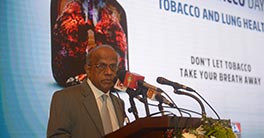
MINISTRY OF HEALTH
Sri Lanka
The serious harm from granting licenses to import cigarettes to Sri Lanka 2019-06-18
- There is a move from the Ministry of Finance to grant licenses to import foreign cigarettes to Sri Lanka. It must be stated categorically that this would be a serious retrograde step that will undermine all the current programmes for preventing the harm from tobacco and other narcotic substances in the country.
- The government, particularly H.E. the President and the Minister of Health have invested considerable efforts and enormous resources to prevent tobacco use over the last five (5) years. This includes development of policies, formulating regulations, enforcement of existing laws and community level interventions. As a result, Sri Lanka shows positive change with declining tobacco usage over last 10 years. The intended license scheme will, practically and symbolically, run counter to these efforts and can negate most of these gains.
- It is alleged that the main objective is to increase revenue for the country. If so, this can be easily achieved by applying a rational tax policy to the existing tobacco industries. The incorrect and irrational tax system on tobacco employed by the Ministry of Finance currently, is incurring a massive loss of revenue for the government. According to calculations, the government lost a hundred (100) billion rupees over the last five (5) years due to this incorrect taxation system. Therefore, to increase the revenue the best option for the Ministry of Finance is to impose a correct taxation system for tobacco. It is very doubtful that they will do so for the new tobacco companies.
- The evidence is clear that tobacco use causes and perpetuates poverty in developing countries and a decline in tobacco use means an economicgrowth in families of low socio-economic status. The new decision of importing foreign cigarettes will reverse most of these positive changes we have achieved as a country. Even the World Bank discourages governments of developing countries to invest or give incentives for the tobacco industry as it negatively affects the economy of the country. This is clearly a retrograde policy.
- Sri Lanka had calculated the economic costs of tobacco use with the support of the World Health Organization and it clearly exceeds the tax income by almost double the amount. The Investment case conducted by the WHO and UNDP and presented on World No Tobacco Day on the 17th June 2019 highlighted the economic case for eliminating tobacco even more clearly. If the Ministry of Finance is thinking of increasing the revenue or real economic growth of the country, tobacco is not the answer. The result will be opposite.
- The World Health Organization (WHO) developed the Framework Convention on Tobacco Control (FCTC) to curb the epidemic of tobacco use. Sri Lanka is one of the signatories. One of the key reasons for introducing this Treaty was the economic harm caused by tobacco. Sri Lanka implementing the convention in a positive manner, but this new decision is completely against the recommendations of the FCTC and regrettably we will be viewed as defaulters.
- During the time when pictorial health warnings in tobacco packs were being proposed, the country experienced the pernicious negative influence of the existing tobacco company. The tobacco company went against the Health Ministers gazette notification of imposing PHWs and delayed the implementation for three (3) years. Therefore, it is evident that multinational industries try to influence the policy of the country and opening the door for new companies will only aggravate the situation.
- If the government is thinking of the well-being of foreign workers in the country the best course of action would be to help them to reduce and quit tobacco use. Giving a helping hand for a person who is addicted to such a lethal product should not be by facilitating his addictive behavior but by creating an environment where tobacco use is discouraged. Research is now clear that tobacco decreases productivity and causes premature death in the workforce. Therefore, human and people friendly governments should never provide new facilities that encourage tobacco use.
- Majority of the major development projects are conducted through Chinese companies and Chinese aid. In this prevailing situation the Chinese government possesses power to diminish efforts of applying correct taxes on Chinese cigarettes. How appropriate is it to allow importing cigarettes from China in the guise of helping Chinese people working temporarily in Sri Lanka?
- Decisions such as this taken by the Ministry of Finance without a long term vision nor a wide consultation negatively affects health, social and economic development of Sri Lankans as well asthe Chinese people. Furthermore, this move will seriously compromise the excellent leadership that H.E. the President is providing to make Sri Lanka a Country Free of Narcotics and the efforts of the Health Minister to eliminate tobacco as a public health problem.



